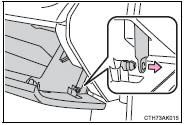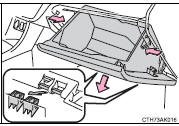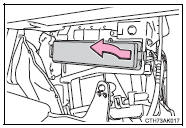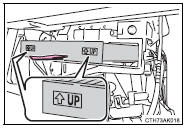Toyota Corolla (E170) 2014–2019 Owners Manual / Maintenance and care / Do-it-yourself maintenance / Air conditioning filter
Toyota Corolla (E170): Air conditioning filter
The air conditioning filter must be changed regularly to maintain air conditioning efficiency.
Removal method
1Turn the engine switch off.
2 Open the glove box. Slide off the damper.

3 Push in the glove box on the vehicle’s outer side to disconnect the claws. Then pull out the glove box and disconnect the lower claws.

4 Remove the filter cover.

■ Replacement method
Remove the air conditioning filter and replace it with a new one.
The “↑UP” marks shown on the filter should be pointing up.

■Checking interval
Inspect and replace the air conditioning filter according to the maintenance schedule. In dusty areas or areas with heavy traffic flow, early replacement may be required. (For scheduled maintenance information, please refer to the “Schedule maintenance guide” or “Owner’s Manual Supplement”.) ■If air flow from the vents decreases dramatica
lly The filter may be clogged. Check the filter and replace if necessary.
NOTICE
■When using the air conditioning system
Make sure that a filter is always installed.
Using the air conditioning system without a filter may cause damage to the system.
Other materials:
Inspection procedure
1 Prepare for inspection
Disconnect the negative (–) terminal cable from the battery, and wait at
least for 90 seconds.
remove the horn button assy .
disconnect the connector of the instrument panel passenger airbag assy
.
disconnect the connector of the front sea ...
Circuit description
Refer to dtc p0130
Hint:
the ecm provides a pulse width modulated control circuit to adjust current
through the heater. The heated
oxygen sensor heater circuit uses a relay on the b+ side of the circuit.
Monitor description
The ecm uses the heated oxygen sensor information to regulate t ...
Vehicle identification
■ Vehicle identification number
The vehicle identification number (VIN) is the legal identifier for your vehicle.
This is the primary identification number for your Toyota. It is used in registering
the ownership of your vehicle.
This number is stamped on the top left of the instrument p ...


